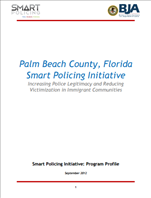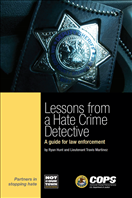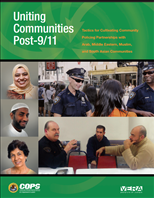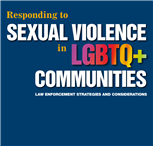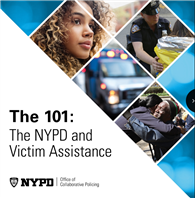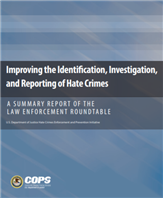Increasing Police Legitimacy and Reducing Victimization in Immigrant Communities
Recent increases in robbery in the city of Lake Worth, Florida have been concentrated in neighborhoods where many of the residents are migrant workers of Guatemalan (and Mayan) descent. The Palm Beach County Sheriff's Office (PBSO) and its research partner at Lynn University sought to address this robbery problem, as well as the challenges surrounding policing immigrant communities more generally, through their Smart Policing Initiative (SPI). The PBSO SPI included targeted efforts to increase police legitimacy, to improve residents' awareness of their victimization risk, and to empower residents to embrace crime prevention in their community.
Lessons from a Hate Crime Detective
Lessons from a Hate Crime Detective is a seven-minute roll call or training film featuring Detective Ellen Vest, a 30-year veteran of the San Diego County (California) Sheriff 's Department. Before her retirement in 2013, Vest developed a training program to help fellow officers and detectives recognize the signs and symbols of hate-based groups, trained officers to document evidence and their suspicions in reports, and worked with prosecutors to identify gang members and investigate hate crimes. In this short film, she distills the most important ideas about hate crimes down to five lessons.
Uniting Communities Post-9/11: Tactics for Cultivating Community Policing Partnerships with Arab, Middle Eastern, Muslim, and South Asian Communities
Since the beginning of this century, policing in the United States has changed profoundly in response to the needs of an increasingly diverse population and to expanded homeland security responsibilities since September 11, 2001. Key to community policing post-9/11 is building relationships of trust between officers and residents - which is particularly necessary with regard to our Arab, Middle Eastern, Muslim, and South Asian (AMEMSA) communities, who have been both targets in need of protection and potential sources of information post-9/11. Law enforcement agencies have received little guidance on how to proactively and practically engage this population. This publication attempts to fill this gap, drawing on the experiences of sworn officers and community members in three jurisdictions with significant AMEMSA populations in New Jersey, California, and Ohio. It aims to explore how community oriented policing strategies could support homeland security initiatives while building stronger, more trustful relationships between communities and police.
Responding to Sexual Violence in LGBTQ+ Communities: Law Enforcement Strategies and Considerations
Sexual violence perpetrated against individuals who identify as lesbian, gay, bisexual, transgender, questioning, and queer (LGBTQ+) warrants the full attention of law enforcement agencies. It is imperative that law enforcement agencies strive to build strong relationships with leaders and members of LGBTQ+ communities and implement effective strategies departmentwide through agency mission, policy, training, and personnel to proactively address and prevent sexual violence in LGBTQ+ communities. The following strategies and considerations are based upon current or emerging promising practices to address sexual violence in LGBTQ+ communities. The content presented was developed in collaboration with national subject matter experts from within and outside of the criminal justice profession. The goal of this resource is to strengthen law enforcement’s understanding of and response to sexual violence in LGBTQ+ communities and should be used in tandem with the IACP Sexual Assault Response and Investigation Policy and Training Content and Investigative Guidelines, and the IACP Sexual Assault Incident Reports: Investigative Strategies. The considerations presented will aid in overall agency strategies to promote an understanding of the complexities of sexual violence in LGBTQ+ communities and encourage the proactive implementation of agency policy and prevention efforts.
The 101: The NYPD and Victim Assistance
This booklet represents 101 ways the New York City Police Department has enhanced its response to victims of crime over the last four years. The featured initiatives are a product of both internal and external consultation. These initiatives are shared with law enforcement around the country, the nation's victims of crime, victim advocates, and the general public in the hope of adding to the national conversation about ways to improve policies and practices. This work will continue for years to come as new ideas are presented.
Improving the Identification, Investigation, and Reporting of Hate Crimes
In 2018, the Hate Crimes Enforcement and Prevention Initiative convened a law enforcement roundtable on challenges and successes in identifying, reporting, and tracking hate crimes. Through robust discussion and analysis, roundtable participants developed recommendations for enhancing hate crimes investigation and reporting that comprise a valuable roadmap for the journey ahead.
FBI 2019 Hate Crime Statistics
In the Uniform Crime Reporting (UCR) Program, the victim of a hate crime may be an individual, a business/financial institution, a government entity, a religious organization, or society/public as a whole. In 2019, the nation’s law enforcement agencies reported that there were 8,812 victims of hate crimes. Of these victims, 260 were victimized in separate multiple-bias incidents.
Responding to Hate Crimes: A Police Officer’s Guide to Investigation and Prevention
Police officers and investigators have important roles to play in responding to hate incidents and crimes. By doing the job efficiently and carefully, police can reinforce the message that hate crimes will be investigated aggressively, thus enhancing the likelihood of a successful prosecution.
Federal and State Hate Crime Laws and Statutes
The Department of Justice enforces federal hate crimes laws that cover certain crimes committed on the basis of race, color, religion, national origin, sexual orientation, gender, gender identity, or disability. The Department of Justice began prosecuting federal hate crimes cases after the enactment of the Civil Rights Act of 1968. The information on this web page explains current federal hate crimes laws.
